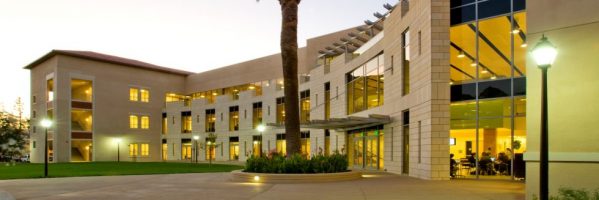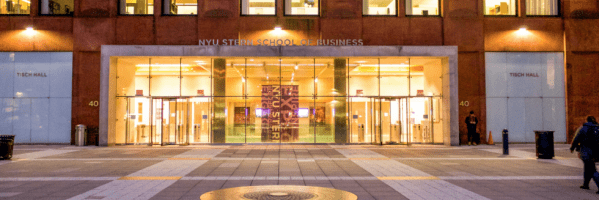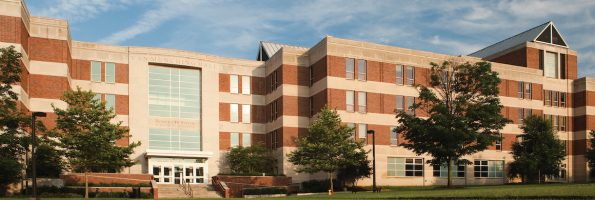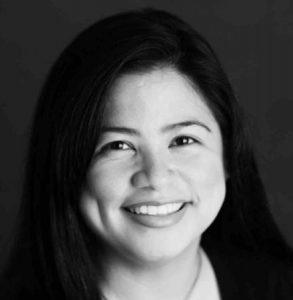Santa Clara’s Sr. Assistant Dean of Graduate Programs Answers Our 5 Questions

In our latest installment of the MetroMBA “5 Questions” series, we speak with Toby McChesney, Ed.D., Senior Assistant Dean of Graduate Programs at the Santa Clara University Leavey School of Business. McChesney talks about the not-so-secret benefits of the school’s MBA programs, the benefits of learning in Silicon Valley, and a local can’t-miss spot you have to see.
1. What’s Something That People May Not Know About the Santa Clara Leavey School of Business MBA Program?
“At SCU’s MBA program, we put students first. Our professors, with their deep Silicon Valley connections, are dedicated to bringing cutting edge curriculum to the classroom. This dedication does not stop there—they want to get to know our students on a personal level, and with our small class sizes, they are able to do that. As full-time faculty, they are available to meet with students to support their academic and professional challenges. Students here at SCU are never a number, and our small but mighty admissions, career and program team work tirelessly to ensure our students are well taken care of.”
2. What Separates the Business School From the Others in the Region?
“When looking at various MBA programs in the area, students should ask themselves if they want to be an MBA student for a few years, or a ‘Bronco for Life.’ Here at SCU, our students are joining a community of like-minded professionals with strong values for integrity, collaboration and leadership. Unlike other programs where competition between students is high, SCU MBA students thrive in a supportive and cooperative environment. This sense of community makes SCU a unique place to learn business, as students learn from one another while applying the concepts they learn in class each evening. Given that 90% of our students are currently employed at top Silicon Valley Companies like Apple, Google, and LinkedIn, this make for a very powerful, yet supportive, learning environment. Also, there are more alumni from the Leavey School of Business living and working in the Bay Area than from any other business school, so the alumni network is unmatched.”
3. What Kind of Prospective MBA Applicant Should Consider Enrolling in Leavey?
“We are looking for applicants that have a strong academic background, not necessarily in business, professional work experience of at least three years and most importantly a generous attitude. We are looking for students who are ‘other-focused,’ and want to use what they learn at SCU to better their teams, their companies, their communities, and the world.”
4. What Unique Opportunities Do Students Have Enrolling in Leavey, Considering its Location in San Jose?
“Our location in Silicon Valley allows our MBA program to draw the cream of the crop to our faculty; we have CFO’s and Venture Capitalists co-teaching our courses. Each class has a Silicon Valley component woven into the curriculum, whether that be a real-time case project, or C-suite co-teaching a course in which they are experts. Santa Clara MBA students will benefit from Silicon Valley experiential learning as well as innovation and entrepreneurship.”
5. If You Can Only Pick One Restaurant in the Area, Where Would You Go?
“The Hut.

The Hut, a San Jose icon, reopened in June 2019 after a temporary three-year closure / Photo via Karl Mondon/Bay Area News Group
The Hut has been an iconic gathering place for all SCU students for many decades, it closed in December 2016 and has just reopened as a restaurant and bar.”
J.P. Eggers, NYU Stern Professor and Vice Dean of MBA Programs, Answers Our 5 Questions

In our latest installment of the MetroMBA “5 Questions” series, we speak with J.P Eggers, Associate Professor of Management and Organizations and the Vice Dean of MBA & Graduate Programs at the NYU Stern School of Business. Eggers talks about the MBA program’s new healthcare specialization, what students need to know before enrolling, and what makes NYU stand out when it comes to the business of healthcare.
1. Why Do You Believe The Time Was Right For NYU Stern To Introduce An MBA Specialization In Healthcare?
“Healthcare is an incredibly important part of the U.S. and global economy, and even more central to New York City given the hospital systems, pharmaceutical companies, and insurance providers within the broader region. As a result and in line with Stern’s continued push to diversify the opportunity set for our students, this became a priority to make our ambitious goals in the healthcare space something visible and public.”

J.P Eggers, Associate Professor of Management and Organizations and the Vice Dean of MBA & Graduate Programs at the NYU Stern School of Business
2. What Particular Kinds Of Applicants Do You Believe Are Right For This Kind of Program?
“This specialization is a good fit for applicants interested in the health system broadly. The curriculum options range from insurance markets to pharma strategy to health-tech, so the scope is ambitious. We expect that students with an interest in finance and marketing roles within health-related companies, or those interested in consulting or banking opportunities with a focus on the health sector, will be most drawn to the specialization.”
3. Is This A Sign Of More Unique MBA Specializations Coming To NYU Stern?
“We take our investments in specializations seriously, having been the first school to offer a FinTech specialization and having a broad range of specializations available. But we’ve found that many students have very specific interests when enrolling in an MBA program, and we will continue to explore and evaluate other opportunities.”
4. Since NYU Stern MBAs Can Study Three Specializations, What Are Some Other Specializations You’d Recommend For Someone Studying Healthcare?
“Since healthcare is a ‘vertical’ (industry) specialization, I expect that any of our ‘horizontal’ (functional) specializations would pair nicely. For those interested in pharma roles, I would think that corporate finance, marketing, or strategy would make sense. For those looking at health systems or consulting, I’d think operations may be a clear fit. And for those interested in health tech, our product management, analytics, and innovation specializations may make sense.”
5. Are There Any Unique Organizations In New York That Will be Part of the Healthcare Specialization?
“As part of Stern’s continued commitment to leveraging the amazing resources that NYU has to offer, we will work with both the NYU School of Medicine and the NYU Wagner School of Public Service on aspects of the specialization. The integration of the health-focused track in the Endless Frontier Labs means that we will utilize our connections to the NYC startup ecosystem. And we will continue to explore potential partnerships beyond those.”
To learn more about the NYU Stern MBA programs and specializations, head over to the official school website.
Rochester Simon Answers 5 Questions About Their MBA Program

In our latest installment of the MetroMBA “5 Questions” series, we speak with Rebekah S. Lewin, the Assistant Dean of Admissions and Financial Aid at the University of Rochester Simon Business School. Lewin talks about the small, close-knit Simon MBA community, the optional STEM designation for all ten specializations, and the program’s highly approachable faculty members. She also introduces the Simon Admissions Blog as an excellent resource for prospective and current students. Read the full interview below to discover the four aspects of the Rochester Simon MBA program that every incoming student needs to know.
1. What should hopeful students know about the program that they may not necessarily know until they start?

Rebekah Lewin, Assistant Dean of Admissions & Financial Aid at University of Rochester
“The Simon program is small by design. The relationships our students build during their time here are the cornerstone of the collaborative, supportive community that defines the Simon MBA. Our class size at Simon is only about 110 students, which allows us to create a unique culture that we have heard time and again has a significant impact on student satisfaction.
The best way to get a sense of life at Simon—and what it’s like to be a part of our inclusive community—is to visit our campus. We offer four Experience Simon Weekend events throughout the year. They’re a great opportunity to interact with current students, alumni, faculty, and staff. We’d love to see you in Rochester!”
2. What makes Rochester Simon stand out amidst other programs?
“Rochester Simon offers an option for STEM designation in any of our ten specializations: Asset Management, Banking, Brand Management, Corporate Finance, Operations, Consulting, Pricing, Product Management, Strategy, Technology, and Venture Capital & Private Equity. Or, you can follow our general management track to choose from a broad selection of courses. STEM designation signals quantitative rigor to employers, and for international students, a STEM-designated MBA offers the ability to extend OPT (Optional Practical Training) by 24 months, for a total of three years to work in the US without H1-B visa sponsorship.
Our inclusive atmosphere benefits all members of the Simon community. Throughout your MBA experience, you’ll study alongside a diverse group of peers with unique experiences and varied perspectives. Forty percent of the Class of 2020 are international students hailing from 17 countries, and 31 percent of our U.S. students are African American, Hispanic American, or Native American. We encourage you to embrace our vibrant community to the fullest–and we know Simon will embrace you.”
3. How accessible are Simon Business School professors? Do they frequently serve as mentors?
“Though highly sought after for their subject-matter expertise and often at the forefront of innovative research, our faculty remain approachable, accessible, and dedicated to their role as mentors. With small classes sizes and a close-knit academic community, you’ll benefit from individual attention that supports your personal and professional growth.”

International students in the Simon Business School MBA Class of 2020 hail from over 17 countries.
4. Are there any courses, clubs, specialty tracks, or events that MBA applicants should know about?
In the spirit of the University of Rochester’s motto Meliora—Latin for “ever better”—we are always in the process of improving and innovating elements of our MBA program as industry needs evolve. Here are a few recent examples:
- Our innovative curriculum is career-focused and allows you to take more elective courses and to take them earlier in your course of study, to better prepare you for your internship experience. You will also choose two breadth electives designed to bolster the professional skills employers desire.
- There are various opportunities to make an impact at Simon, like our Net Impact club, which inspires, educates, and equips individuals to use the power of business to create a more socially and environmentally sustainable world. Simon’s chapter was one of two finalists for Net Impact Graduate Chapter of the Year in 2018. In addition, Simon VISION Consulting provides pro-bono consulting services to pro-profit and not-for-profit businesses throughout the Greater Rochester area.
- In order to expand your understanding of the global business marketplace, you need to see it up close. We offer international exchange programs in Finland, Germany, and Japan for the Spring A semester of the second year of the MBA program. In addition, we also offer shorter 10 to 12-day career treks and academic immersions to China, India, Israel, South Africa, and Switzerland.
- This year, Experience Simon Weekend with Diversity Conference Programming (Oct. 11-12) is the culmination of Simon’s Diversity and Inclusion Week. Our Experience Simon Weekend with Women’s Conference Programming (Nov. 8-9) grows more popular each year, a trend we expect will continue. We would love to host you here in Rochester for any of these events! Visit our website for more details.”
5. What’s your favorite online blog that you would recommend for students?
“We might be biased, but we think the Simon Admissions Blog is a great resource as you’re preparing for business school! It’s a great place to find everything from advice on navigating the admissions process from members of our Admissions Committee, to guest posts from students, Simon news updates, alumni videos, links to new Simon Bizcast podcast episodes, and more.”
Penn State Smeal Director of Admissions Answers 5 Burning MBA Questions

In our latest installment of the MetroMBA “5 Questions” series, we speak with Michael Waldhier, the Director of Admissions at Penn State University’s Smeal College of Business. Waldhier talks about the close-knit, collaborative community at Smeal, his alumni experience, and the many activities, clubs, and opportunities available for students. He also shares about the 150-year-old Penn State Berkey Creamery—excuse us while we go grab some ice cream!

Michael Waldhier, Director of Admissions at Penn State’s Smeal College of Business
1. What is the Smeal College of Business’ greatest asset and what do you wish MBA students knew more about?
“Rather than discussing our #1 ranking in supply chain management or the fact that Penn State has the largest active alumni network in the country, I honestly think our greatest asset is our class—specifically the individual, tightly-knit, collaborative atmosphere that exists in our MBA program. We only accept 60 students per year in the resident MBA program, which allows for an unparalleled amount of interaction within the cohort, and ensures that faculty and staff build strong, personal relationships with everyone in the class.”
2. What makes the Smeal College of Business a special place for you?
“In addition to being Director of Admissions, I am also an alum of the Smeal MBA program, and remain extremely close to most of my classmates and many of the professors who still teach in the program today. After graduation, I was fortunate to land a principal role in strategy consulting and had the wonderful opportunity to travel extensively over the course of my career. When it was time to transition to something new, returning to Penn State, to ‘Happy Valley,’ and to Smeal was an easy decision for my family to make. This program had an enormous positive impact on my life and set me on the path to success, and I can’t think of any better way to pay it forward to future generations of Smeal MBAs than to be where I am today.”
3. How would you describe the culture of the Smeal College of Business? Is it more collaborative or competitive?
“As mentioned, given the small size of our MBA community and the amount of teamwork that is required throughout the experience, our program is extremely collaborative, so much so that students often help each other to broaden networks, land internships and jobs, and even study for exams. We put a lot of emphasis upon collaboration and teamwork, and students will recognize each other for positive contributions to the program that are aligned with the Penn State Values of integrity, responsibility, excellence, respect, discovery, and, of course, community.”
4. How does Smeal help MBA students pursue their special interests?
“While the MBA program itself may be very small in size, Penn State University is one of the largest in the nation, and there are activities and special interest clubs and groups for virtually everyone. Within the MBA program, we have numerous clubs and associations for students to join such as the MBA Association, Consulting Club, Net Impact, Finance Association, Military and Veterans MBA Association, and more. In addition, students have access to courses across the university if they want to explore a topic outside of the core Finance, Marketing, Supply Chain, and Consulting concentrations. To that end, we have packaged optional programs of study in nearly 20 topic areas, with more being added each year. This allows students the flexibility to customize their MBA experience and pursue just the right mix of coursework to satisfy any career or personal interest.”
5. What is your favorite part of the Penn State campus?

“There are a plethora of wonderful hiking and biking trails in the mountains surrounding Penn State, but the Arboretum is a special place where one can walk through gardens inspired by cultures across the world and study or relax amidst fountains and koi ponds,” Waldhier says.
A lot of people will talk about the Penn State Berkey Creamery, which has been making ice cream for over 150 years, or Beaver Stadium, one of the largest college football stadiums in the United States, but one of my favorite places on campus is the Penn State Arboretum. There are a plethora of wonderful hiking and biking trails in the mountains surrounding Penn State, but the Arboretum is a special place where one can walk through gardens inspired by cultures across the world and study or relax amidst fountains and koi ponds. It also helps that it is right next door to the Smeal College of Business, so students frequently go there after class for team meetings or to relax and unwind after a stressful day.”
5 Questions with the Senior Director of MBA Admissions at Maryland Smith

In our latest installment of the MetroMBA “5 Questions” series, we speak with Maria Pineda, the Senior Director of Admissions for the Full-Time MBA Program at the University of Maryland R.H. Smith School of Business. Pineda talks about the ideal MBA candidate, provides advice for getting accepted, and discusses unique opportunities at the school such as the Lead Fearlessly leadership development program.
1. What are you most excited about when it comes to the future of Maryland Smith?
“Smith is becoming a hub for designing the future. Business is becoming more competitive, more complex, more global, and more innovation-driven. Information, data, and technology are driving huge societal changes, often in ways that we can’t anticipate. We are preparing students to lead fearlessly, not just in today’s world, but in the world we can’t even imagine yet.
Smith MBAs learn how to turn data into insights, and insights into action. Our faculty bring their research into the classroom in ways that make even the most complex concepts relevant to managerial decision-making. The curriculum is designed to give students a strong foundation in analytical thinking and business fundamentals, and sharpen and hone leadership skills. With those skills, they’re ready to analyze problems, think creatively, innovate, and then lead a team to execute around a solution. As the economy keeps evolving, our students will be able to adapt.”
2. What does your ideal MBA candidate look like?
“First, we want self-starters, people who will take the initiative to pursue the many unique opportunities for learning and ‘transformation that come with a top MBA program. Our MBA students have a learning mindset. They are self-aware enough to “know what they don’t know’ and are adaptive, flexible and willing to work to grow their analytical skills and leadership competencies. We’re also looking for people who will actively contribute to our diverse, collaborative community, and seek out and consider viewpoints different from their own. We know that those traits—resourcefulness, a learning mindset, and an inclusive attitude—make fearless leaders.”

Maria Pineda, Senior Director of Admissions, Full-Time MBA Program
3. What is one thing a Maryland Smith MBA candidate can do for the best chance of getting accepted?
“Take control of your story. It all starts with self-reflection—know what your goals are and what you want to do with your MBA. Present yourself as if it was a job interview. Give us a good overview of your career accomplishments so far, and a thoughtful take on what you hope to accomplish in the future. Be authentic through the process, even as you’re bringing your best self to the table.
And get to know us! Connect with members of the admissions team and interact with current student ambassadors. That will help you see where your career goals align with our program’s distinctives.”
4. What parts of the MBA program should more students know about before starting their graduate school career?
“There are so many opportunities to develop your skills and leadership abilities beyond the classroom that you’ll need to curate your experiences. At Maryland Smith, those include opportunities like the Lead Fearlessly leadership development program, where students sharpen their leadership skills through out-of-the-box experiences like a yacht race on the Chesapeake Bay or small-group sessions with an executive coach. Or students can take on a challenge at the Datathon, part of the Smith Analytics Consortium’s annual conference, which brings together faculty and students with corporate partners. And there are case competitions, club leadership, consulting opportunities, and many more.”
5. Why do you love living and working in Maryland?
“Everyone knows about the many government agencies and NGOs headquartered in Washington DC, just seven miles from campus. But there are also many companies doing exciting work in biotech, defense, and cybersecurity. The job market is always fantastic (people say our local economy is recession-proof).
We have access to the culture, restaurants, and nightlife of a big city, with world-class attractions, a varied, high-quality performing arts scene and every pro sport you can name. We have beautiful outdoor spaces that are accessible from the hundreds of miles of biking and hiking trails around the region, whether you love the ocean or the mountains. And we have a really diverse mix of people that makes for a rich and interesting environment.”
Associate Director of MBA Recruitment at Oxford Saïd Answers 5 Questions

In our latest installment of the MetroMBA “5 Questions” series, we speak with Mariel Kessel, the Associate Director of MBA Recruitment at the University of Oxford Saïd Business School. Kessel talks about the role of research at the school, introduces a new professor of finance and Global Opportunities and Threats module, and offers advice for prospective MBA candidates.
1. What opportunities outside of the classroom does Oxford Saïd offer MBA students?
“In addition to our core courses and extensive elective offerings, MBA students have the opportunity to further their learning through a variety of co-curricular and extra-curricular options, including the Oxford Saïd Finance Lab, Social Impact Lab, or Seed Fund—a student-led initiative that allows MBA candidates to gain first-hand investment experience.
International electives will see students learn in real-world scenarios in the U.S. or Africa, and the entrepreneurship and social impact opportunities offered by the Skoll Foundation, Oxford Foundry, and Entrepreneurship Centre are limitless. Outside of the business school, students will be part of the wider University of Oxford community and can meet fellow students from a great variety of disciplines and backgrounds.”
2. In what ways does research play an integral role in the Saïd MBA program?
“A great example of research playing an integral role in the Oxford Saïd MBA program is through an online workshop for women leaders called ‘Owning your career,’ which takes place during the school’s activities around International Women’s Day this year. The module draws on research findings from interviews with female CEOs, undertaken as part of Oxford’s CEO Research Project and focuses on one of the three themes identified in the article based on that research: self-acceptance, self-development, and self-management.”
3. Are there any new programs, initiatives, faculty, or events that you can share with us?

Mariel Kessel, Associate Director of MBA Recruitment
“We are very excited to have Renee Adams join us as a Professor of Finance. Her work highlights organizational design problems to which seemingly inefficient governance mechanisms are the solution. Her research also highlights the role selection plays in understanding corporate leaders.
Our Global Opportunities and Threats: Oxford (GOTO) module focuses on the future of energy this year and is designed to create a collaborative community that can tackle world-scale problems. Each year, students are tasked with a different problem to solve and assigned tutors from across the broader university who aid and assess their work. The module culminates in a summit, at which select groups present their findings to a panel of leaders from both industry and academia.”
4. What is one piece of advice you would give to a prospective MBA student?
“My best advice is to find the school and program that feels like the right fit for you. It’s a once in a lifetime opportunity (and commitment) so don’t get caught up on one aspect (i.e., fee, rankings, one specific elective). Instead, talk to alumni, staff, current students, visit if that’s an available option for you and, finally, go with your gut and you will end up at the right school for you and your career goals.”
5. What’s a great nearby restaurant or location for networking?
“We have a fantastic common room, gardens, and canteen at Oxford Saïd, so students don’t need to travel far to find great locations to socialize and network. However, Oxford is of course blessed with a fantastic variety of restaurants and pubs, including the historic Turf Tavern, which first opened in 1381 and counts CS Lewis and Stephen Hawking among its former clientele.”
About the Oxford Saïd Business School
The University of Oxford Saïd Business School blends the new and the old. The business school was founded in 1996, but the University dates back 1,000 years and is regarded as the oldest English-speaking university. This creates a unique dynamic at the school where tradition meets innovation. On the school website, they state, “We create programmes and ideas that have global impact. We educate people for successful business careers, and as a community seek to tackle world-scale problems.” They do this through delivering cutting edge programs including a One Year MBA, Executive MBA, 1+1 Program, Masters in Financial Economics, Masters in Law and Finance, and a Masters in Major Program Management.
“A transformative experience. Saïd Business School reframed my mindset and gave me an invaluable network.” —Nadine El Sharif, MBA student
Learn more about the University of Oxford Saïd Business School by visiting the school website.
